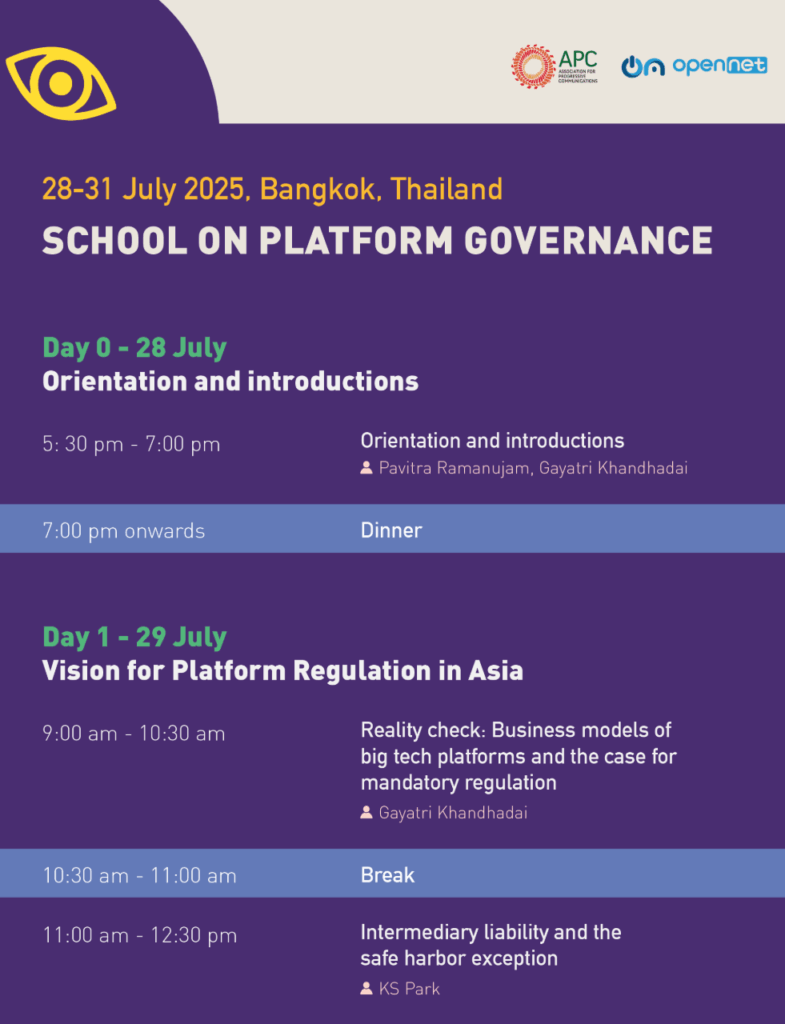
Open Net co-sponsored a school on platform governance with Association for Progressive Communication on July 28-31, 2025. Open Net’s role was to draft the curriculum, design and recruit the facilitator line-up, select the participants, and actually be responsible for facilitating some parts of the curriculum: Evolution of Intermediary Liability Safe Harbor and Data Protection Governance and Platforms. Admittedly, Open Net and APC have been more on the side of defending the internet from the state sponsored censorship, surveillance or access impoverishment, which is still the biggest problem at least in Asia, but the past decade witnessed the rising concern with the harms arising out of the contents available on the internet. Some of the platform accountability initiative has been hijacked by authoritarian elements around the world into strengthening censorship as in the case of how NetzDG has inspired a series of administrative censorship schemes in Southeast Asia. We believed that DSA, an upgraded platform accountability norm built on the DMCA’s tested notice-and-takedown, presents an interesting opportunity for Asia where even intermediary liability safe harbor has not been even established.
Excerpt from one of the closing notes of those present captures the gist of the discussion there :
What is the best way to moderate harmful content online?
Should platforms be forced to do it? Or should they be incentivized?
Europe and the U.S. have largely chosen the latter path, as seen in the Digital Services Act (DSA) and the Digital Millennium Copyright Act (DMCA).
But why is forcing platforms problematic?
First, only states have the power to force platforms—and once we rely on state power, we open the door to its abuse. That power can be used not only to curb harmful content, but also to silence dissent and suppress legitimate expression.
Second, legal enforcement is limited in scope. The law can only address illegal content. But not all harmful content is illegal—think of misinformation, hate speech that falls just short of legal thresholds, or algorithmic amplification of divisive narratives.
Third, when states start forcing content moderation, they often introduce adjacent laws to tighten their grip—like data localization and data retention laws, which expand surveillance and compromise users’ privacy.
Fourth, heavy-handed regulation raises compliance costs, which disproportionately burden small and midsize platforms. The result? Further entrenchment of Big Tech monopolies.
So, what’s the upside of incentivizing platforms instead?
The opposite of the above.
We avoid overreach and censorship by the state. Platforms gain flexibility to act on a wider range of harmful—but lawful—content. Governments are less likely to layer on surveillance-heavy requirements. And smaller platforms stand a better chance of surviving and thriving.
How do we incentivize them?
By offering liability exemptions if they take responsible, vigorous action—like notice-and-takedown systems. That was the idea behind the DMCA, which has, at least in some ways, successfully incentivized copyright moderation for past few decades.
I started this talk with the goal of moderating online harms. But that is not the only goal we should be concerned about.
What is the true vision of the internet? Internet gives voices and opportunities to powerless individuals. The reason we are worried about internet now is because there is no diversity of platforms that marginalized groups and vulnerable populations feel safe at.
We are talking about the platform accountability but how about the state responsibility? The state also has obligation to realize the true vision of the internet, by staying away from censorship and by limiting platform monopoly. This is why Europe came up with DSA, which is still a liability-exempting law, and DMA, which is an anti-monopoly law. If an Asian state is so poor that it cannot make everyone safe and well fed, the state has an obligation to at least protect the internet through which powerless individuals can connect with one another to build democracy and economy. Which Asian state does that? This is not the time to give more power to the states in Asia. This is the time to push back against state control over the internet.


0 Comments